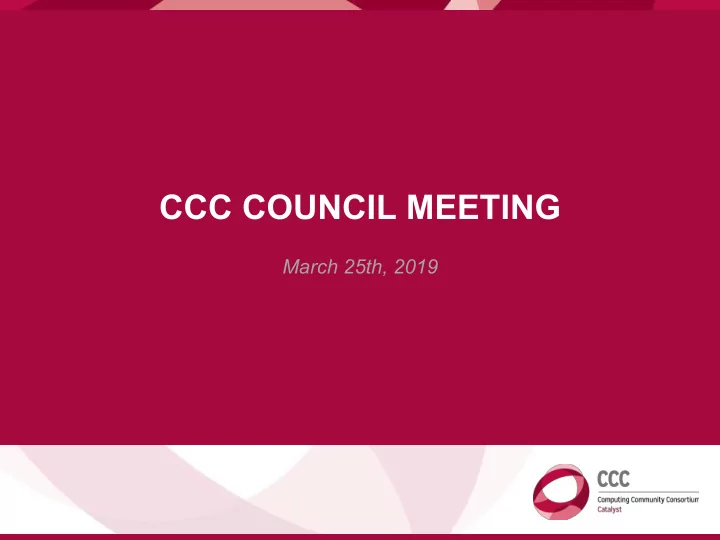

CCC COUNCIL MEETING March 25th, 2019
AGENDA • Welcome and Introductions • Task Forces • Industry Working Group • BREAK • AAAS Recap and Next Year • Discussion • LUNCH • Artificial Intelligence • New Initiatives • BREAK • Report from NSF • Next Steps • Adjourn
INTRODUCTIONS / GENERAL UPDATES
TASK FORCES
CYBERSECURITY AND CYBERCRIME • Code 8.7 Workshop and Next Steps • Leadership in Embedded Security Report 5
HEALTH AND HUMAN COMPUTER INTERACTION • Content Generation for Workforce Training, 3/19 • Addiction Workshop, 11/19 6
Content Generation for Workforce Training March 14-15, 2019
Workshop Goal: Define a computing research agenda to support the development of tools for workforce training.
26 Participants (+ CCC Staff): • Currently engaged in workforce training -- gov’t and commercial • Currently engaged in education/training research • Currently engaged in VR/graphics/HCI research
Examples -- Centers for workforce training Chuck Erik Spangler Verlage
Examples -- Training research Louise Yarnell Kapil Chalil Madathil
Examples – VR research Carolina Cruz-Niera Greg Welch
Examples – Graphics Research Tomer Weiss Eakta Jain
Content Generation for Workforce Training – Results Demand for Training -> Learning System Design Needs -> Technical Research Needs
Content Generation for Workforce Training – The Demand Exists Manufacturing Health Care Construction ... Veterans’ transition to civilian employment Personalized, more inclusive training Accessible to small businesses Training of teams Transferring expertise Government has already invested in training centers
Content Generation for Workforce Training – Research Issues – Learning System Design to Address Demand 1. More efficient ways to elicit knowledge from both SMEs and existing technical documentation. 2. Guidelines for determining how many XR elements provide “just enough” support to facilitate learning. 3. Tools for embedding assessments and analytic tools into XR learning experiences to support personalization and ongoing evaluation. 4. Entry points into existing XR materials so they may rapidly update and locally adapt that content. …
Content Generation for Workforce Training – Research Issues – Technical Research to Support Learning Systems 1. Multimodal capture (vision, audio, haptic) to annotated performance of tasks. 2. Establish levels of realism (visual/audio/haptic) and simulation required for different training types 3. Procedural content specification with controls over fidelity and systems performance (in contrast to demands of game/feature film). 4. Multi-user systems for team training – unique networking requirements. …
INFORMATION INTEGRITY AND PROVENANCE • Misinformation Roundtable tomorrow! 18
INTELLIGENT INFRASTRUCTURE • Collaboration with GCTC 19
FAIRNESS AND ACCOUNTABILITY • Economics and fairness workshop – May 22-23rd, 2019 20
SYSTEMS AND ARCHITECTURE • Workshops Run & Reports Done – Thermodynamic Computing, 1/19 • Working on report • Upcoming: Wide-Area Data Analytics workshop 21
INDUSTRY ENGAGEMENT: TRANSPORTATION • Report and Next Steps 22
Industry Working Group Interim Report Report
Significant trends in increased faculty engagement with industry • Impact on teaching mission • Undergrads • Grads • Academic pipeline • Impact on the research agenda • Shift from long term to short term • Connection to availability of data, resources • Driven by market • Understanding the potential for conflicts
Questions Raised by Interim Report • More data gathering needed • Questions • Is this a real trend? • How much influenced by geography? • Impact by research area • Lasting trend or only short-term impact? • What is the real impact on undergraduates?
Next Steps • Get more input based on feedback from the interim report • Data collection – how much, when, how? • Gather current practices, document arrangements, mitigations • Shwetak has been working on this • Understand new / effective methods of engagements between industry/academia • Lablets • Company initiatives with universities • Shared competitive challenges
BREAK
AAAS • AAAS 2019 – P7: A New Paradigm for Health Care in the 21st Century – Socio-technical Cybersecurity: It’s All About People – Sustainably Feeding Ten Billion People – Cybersecurity: Transcending Physics, Technology, and Society • AAAS 2020 – Submissions due April 18th – Theme “Envisioning Tomorrow’s Earth” – Location: Seattle, WA – Date: Feb 13-16, 2020 Ideas?
DISCUSSION
LUNCH
AI ROADMAP PROCESS • W1: Integrated Intelligence – Chairs: Marie desJardins and Ken • AAAI Town Hall (Jan 28) Forbus – Understanding the mind • Draft of executive summary – Composing intelligent capabilities posted (mid-March) – Open repositories of knowledge • W2: Interaction (Jan 8-9) • Drafts of workshop reports and – Chairs: Kathy McKeown and Dan recommendations to CCC for Weld – Interactions that matter review (early April) – Trust and responsibility • Feedback telecon (Apr 9) – People interacting online • W3: Learning and Robotics (Jan • Draft released for broader 17-18) comment (mid-April) – Chairs: Tom Dietterich and Fei-Fei Li • Final release (May) – Deeper learning – Integrating statistical learning and symbolic representations – Diversified learning modalities
Bart Selman, Cornell
New Initiatives • CS for Social Good • FCRC • New Visioning Proposal • Engagement • etc. 33
BREAK
JIM KUROSE, NSF
Next Steps
New Council Members Joining July 1st! Katie Siek, Indiana University Tom Conte, GA Tech HCI Elisa Bertino, Purdue Sujata Banerjee, VMware Architecture, optimization Information Security and Software Defined Networking Database Systems Maria Gini, University of Minnesota Melanie Mitchell, Portland State Chad Jenkins, University of Michigan Robotics University Robotics Artificial Intelligence
Recommend
More recommend